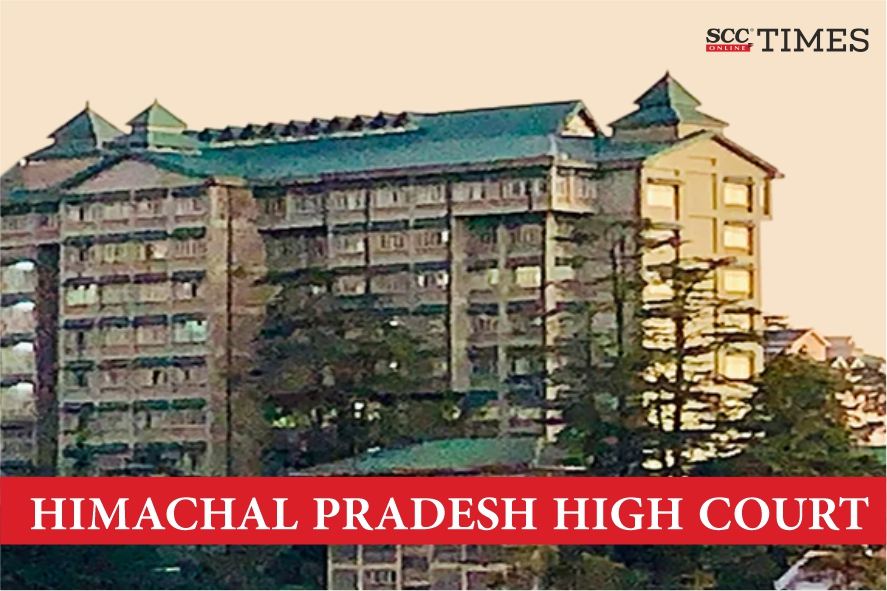HP HC declares S. 163-A H.P. Land Revenue Act unconstitutional

Himachal Pradesh High Court: In the present petition, the constitutional validity of Section 163-A of the H.P. Land Revenue Act, 1954 (‘1954 Act’) was challenged on the grounds that the provision encouraged illegal occupation of Government land. The Division Bench of Vivek Singh Thakur and Bipin Chander Negi*JJ., while observing that the provision defeated the very purpose for which the Statute was created and violated the very edifice of the principal statute, declared it unconstitutional as being violative of Article 14 of the Constitution.
Background:
The present petition was filed in 2002, questioning the validity of Section 163-A of the 1954 Act whereby the encroachments on Government land were sought to be regularised. The State in its reply to the petition informed that there existed approximately 57,549 cases of encroachments on Government land in the State covering an area of about 1,23,835 bighas or 10,320 hectares.
Earlier, the cases of encroachments on Government land used to be decided under Rule 27-A of the H.P. Nautor Land Rules, 1968 but it was kept in abeyance. From 1983, the instructions qua regularisation of encroachments were issued by the Government from time to time and the same were ultimately revised in 1994 permitting the regularisation of up to 2 bighas of the land contiguous to the ownership land, which was challenged by way of public interest litigation. The Court, while striking it down, had expressed anguish on the Government’s failure to protect its property and indulging in legalising an illegality by an executive action in favour of unscrupulous people who had encroached by violating the provisions of law.
Thereafter, a high-powered committee (‘HPC’) was constituted to examine the issue of encroachment in the State and was asked to suggest a viable solution to the endemic problem. The HPC proposed the incorporation of Section 163-A in the 1954 Act, in other words, to legalise illegality. Upon the HPC’s recommendations, response of public at large and Panchayati Raj Institutions and after the discussions at various levels, the State brought about the amendment to incorporate Section 163-A in the 1954 Act.
The petitioner submitted that during pendency of present petition, the State, vide Notification dated 19-04-2017, had notified Draft Rules for regularization of encroachment by publishing it in the Rajpatra of Himachal Pradesh for inviting objections. Though the Rules were never finalised, but on the basis of said Draft-Notification, many people had approached this Court for staying the eviction proceedings initiated by competent authorities for removal of encroachment from the Government land and in a number of cases, this Court had granted the stay till the formation of such Rules, but subject to their judicial scrutiny. However, the Advocate General, informed that the State Government was not going to frame any Rules for regularization of encroachment based on the Draft Rules or otherwise and as on date, there was no such proposal pending with the Government.
Analysis, Law and Decision:
The Court referred to State of Bihar v. Bihar Distillery Ltd., (1997) 2 SCC 453and observed that an enactment represented the will of the people and hence carried with it a presumption of constitutionality. A Court was expected to recognize the fundamental nature and importance of the legislative process and accord due regard and deference to the same and the unconstitutionality of an enactment must be plainly and clearly established.
The Court cited Sd bands v. Karnataka srtc, (2011) 15 SCC 695wherein the Supreme Court had directed the Governments of all the States and Union Territories to consider the desirability of making amendment in Section 441 IPCin line with the State amendments made by Orissa and Uttar Pradesh and to make unauthorised occupation of public premises a non-bailable offence but noted that the Union of India stated that there was no necessity to amend the law as the number of unauthorised occupants was very small.
The Court emphasised that it was the duty of the State to govern, and good governance included implementation of the statutes in existence which dealt with encroachment. The Government’s failure to have the provisions of such a statute implemented amounted to a failure in the governance and promoted dishonesty while encouraging the violation of law.
The Court observed that in making laws and in understanding the scope and purport of laws enacted by the State Legislatures the principles, namely, ‘Inter-Generational Equity’, ‘Sustainable Development’, ‘Public Trust Doctrine’, ‘State responsibility’, ‘Individual responsibility’, and Articles 48-A, 51-A(g) and 21 of the Constitutionwere to be kept in mind.
The Court opined that by condoning the illegal acts of the violators who carried out encroachments, the State intended to treat such law breakers as equal to those persons who abided by the law which was arbitrary because by treating un-equals alike, the State was violating Article 14 of the Constitution. The Court noted that the object of the impugned provision was violative of Article 14 of the Constitution as Article 14 was not meant to perpetuate illegality or fraud but was a positive concept.
The Court observed that in the present case, even though the classification of the persons was based on intelligible differentia as it consisted of those persons who carried out encroachments in violation of the statutory provisions, it was not a valid classification as envisaged under Article 14 because the regularization of illegal encroachments could not be said to have a nexus with the object sought to be achieved, which in any case had to be lawful.
The Court opined that the impugned provision was destructive of the aim and object of the parent statute, defied the constitutional provisions, and was excessively contradictory and mutually destructive and therefore, such a statutory provision could not be permitted to remain on the statute book. The Court referred to In the path v. State of U.P., (2010) 15 SCC 218wherein it was held that the Court could not be a silent spectator and was bound to perform its constitutional duty for ensuring that the public property was not frittered by unscrupulous elements in the power corridors and acts of grabbing public land were properly enquired into and appropriate remedial action was taken.
The Court also noted that the functionaries adopted an ostrich like approach as it was not that thousands of encroachments came up overnight and that no action was taken against the erring officials, who, in connivance, allowed such encroachments to happen, throughout the State.
Further, in the 1954 Act, under Section 163, an encroacher against whom proceedings for removal of encroachment were initiated could invoke a plea of adverse possession. The Court referred to State of Haryana v. Mukesh Kumar, (2011) 10 SCC 404wherein the archaic law of adverse possession was observed to be irrational, illogical, wholly disproportionate, in conflict with justice and one which an ordinary Indian citizen would find reprehensible.
Considering the above analysis, the Court allowed the petition and passed the following directions among others:
- Section 163-A of the 1954 Act was manifestly arbitrary and unconstitutional and therefore Section 163-A and the Rules framed thereunder were quashed.
- The State Government must consider amendment in the law pertaining to ‘criminal trespass’ by bringing it in consonance with the State amendments in Uttar Pradesh, Karnataka and Orissa.
- To ensure removal of encroachment on the Government land by initiating suitable proceedings against the encroachers, to be concluded on or before 28-02-2026.
- Any stay granted against removal of encroachment for pendency of this petition or any other ground, stood vacated and any such order was declared ineffective and unenforceable.
- In light of Mukesh Kumar (supra) and Ravinder Kaur Grewal v. Manjit kaur, (2019) 8 SCC 729the State must consider removal of the provision from Section 163 of the 1954 Act, whereby an encroacher could claim title based on adverse possession.
-
In lands acquired for public purposes where the previous owner has either not vacated or re-occupied such land, plea of adverse possession would not be available and instead the encroacher would be liable to pay the cost of removal, use and occupation charges as well as receiving of benefits deserved from such land.
[Punam Gupta v. State of H.P., CWP No. 1028 of 2002, decided on 05-08-2025]
*Judgment authored by: Justice Bipin Chander Negi
Advocates who appeared in this case:
For the Petitioners: Surinder Sharma, Advocate.
For the Respondents: Anup Rattan, Advocate General with Varun Chandel, Additional Advocate General and Seema Sharma, Deputy Advocate General, Balram Sharma, Deputy Solicitor General of India, [Senior Advocate] with Rajiv Sharma, Advocate, B.N. Misra, Sr. Advocate with Vandana Misra, Advocate.

